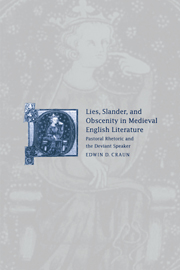 Lies, Slander and Obscenity in Medieval English Literature
Lies, Slander and Obscenity in Medieval English Literature Published online by Cambridge University Press: 31 October 2009
John Gower endows his pastoral voice with a name and a specific priestly task, if not a local habitation. Genius may come out of nowhere, like the speaker of Patience, but he has an identity. Gower makes a priest of Venus out of a figure created – and recreated variously – by classical and high medieval texts: a tutelary spirit incarnate in every human and a figure representing generation as the natural force of material existence (most notably in Alain de Lille's De planctu naturae and, focused more insistently on procreation, in Jean de Meun's part of the Roman de la rose). Summoned by Venus to conduct a confession, this Genius becomes even more complex when he announces that he not only will serve Venus by speaking of love but will also adhere to a priest's office by speaking of vice. Moreover, his discourse, not on a single sin but on all the Capital Seven and their offspring, is directed to a specific hearer: a lover who seeks release from lovesickness but who is commanded by Venus to tell first the full truth about his experience in love. The confessional dialogue gives this lover, as well as the controlling priest, a voice. The Confessio Amantis presents sequences (nearly forty) of interrelated acts of speech: the confessor's exposition of a type of sin, culminating in an invitation to confess it; the lover's confession; one or more tales directed by the confessor, as part of pastoral counsel, at what has been confessed. Within each, the lover counters his priest's discourse, accepting, adapting, modifying, subverting, contesting, ignoring.
To save this book to your Kindle, first ensure [email protected] is added to your Approved Personal Document E-mail List under your Personal Document Settings on the Manage Your Content and Devices page of your Amazon account. Then enter the ‘name’ part of your Kindle email address below. Find out more about saving to your Kindle.
Note you can select to save to either the @free.kindle.com or @kindle.com variations. ‘@free.kindle.com’ emails are free but can only be saved to your device when it is connected to wi-fi. ‘@kindle.com’ emails can be delivered even when you are not connected to wi-fi, but note that service fees apply.
Find out more about the Kindle Personal Document Service.
To save content items to your account, please confirm that you agree to abide by our usage policies. If this is the first time you use this feature, you will be asked to authorise Cambridge Core to connect with your account. Find out more about saving content to Dropbox.
To save content items to your account, please confirm that you agree to abide by our usage policies. If this is the first time you use this feature, you will be asked to authorise Cambridge Core to connect with your account. Find out more about saving content to Google Drive.